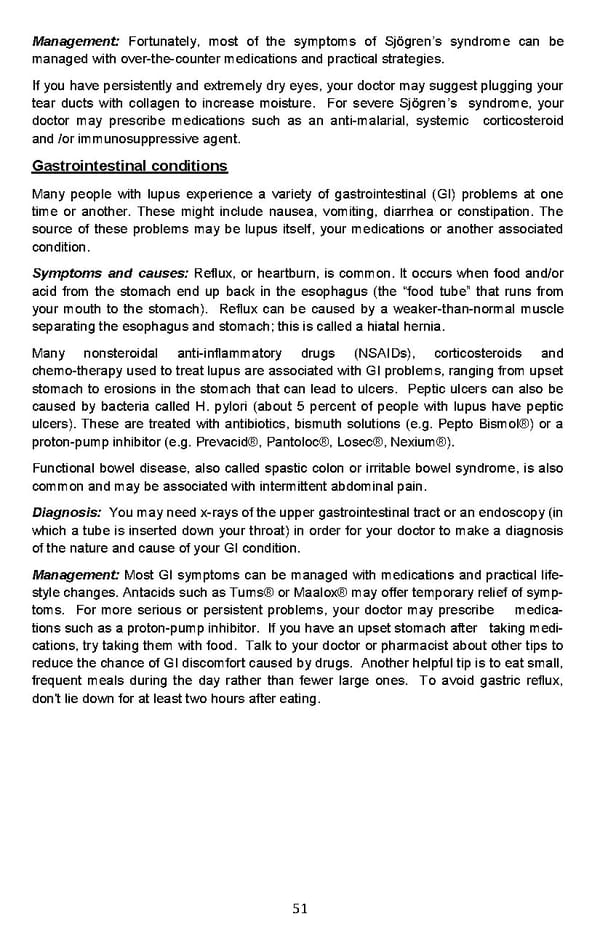Management: Fortunately, most of the symptoms of Sjögren’s syndrome can be managed with over-the-counter medications and practical strategies. If you have persistently and extremely dry eyes, your doctor may suggest plugging your tear ducts with collagen to increase moisture. For severe Sjögren’s syndrome, your doctor may prescribe medications such as an anti-malarial, systemic corticosteroid and /or immunosuppressive agent. Gastrointestinal conditions Many people with lupus experience a variety of gastrointestinal (GI) problems at one time or another. These might include nausea, vomiting, diarrhea or constipation. The source of these problems may be lupus itself, your medications or another associated condition. Symptoms and causes: Reflux, or heartburn, is common. It occurs when food and/or acid from the stomach end up back in the esophagus (the “food tube” that runs from your mouth to the stomach). Reflux can be caused by a weaker-than-normal muscle separating the esophagus and stomach; this is called a hiatal hernia. Many nonsteroidal anti-inflammatory drugs (NSAIDs), corticosteroids and chemo-therapy used to treat lupus are associated with GI problems, ranging from upset stomach to erosions in the stomach that can lead to ulcers. Peptic ulcers can also be caused by bacteria called H. pylori (about 5 percent of people with lupus have peptic ulcers). These are treated with antibiotics, bismuth solutions (e.g. Pepto Bismol®) or a proton-pump inhibitor (e.g. Prevacid®, Pantoloc®, Losec®, Nexium®). Functional bowel disease, also called spastic colon or irritable bowel syndrome, is also common and may be associated with intermittent abdominal pain. Diagnosis: You may need x-rays of the upper gastrointestinal tract or an endoscopy (in which a tube is inserted down your throat) in order for your doctor to make a diagnosis of the nature and cause of your GI condition. Management: Most GI symptoms can be managed with medications and practical life- style changes. Antacids such as Tums® or Maalox® may offer temporary relief of symp- toms. For more serious or persistent problems, your doctor may prescribe medica- tions such as a proton-pump inhibitor. If you have an upset stomach after taking medi- cations, try taking them with food. Talk to your doctor or pharmacist about other tips to reduce the chance of GI discomfort caused by drugs. Another helpful tip is to eat small, frequent meals during the day rather than fewer large ones. To avoid gastric reflux, don't lie down for at least two hours after eating. 51
 Living Well With Lupus Facts Booklet Page 50 Page 52
Living Well With Lupus Facts Booklet Page 50 Page 52